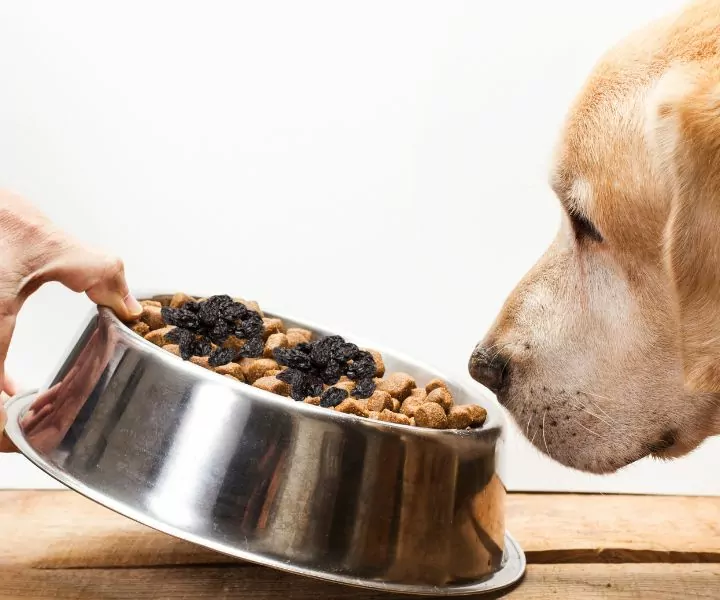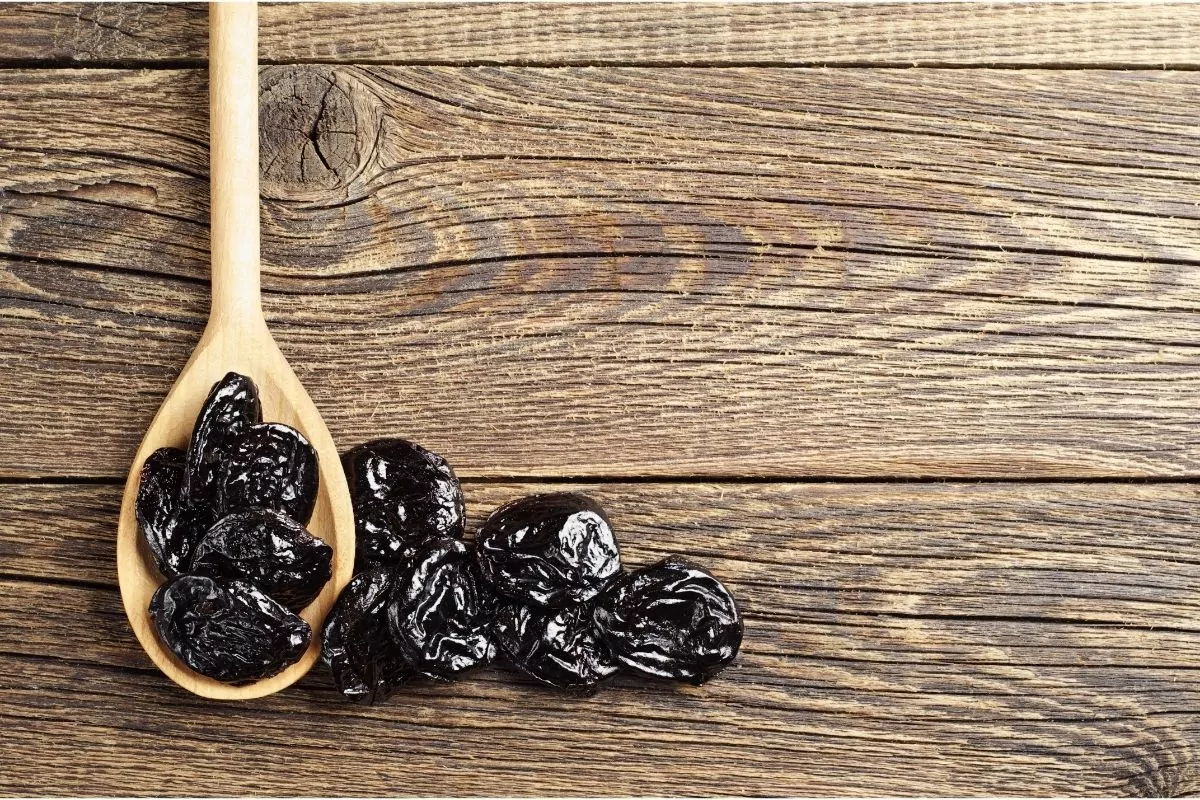Prunes and Dogs
Are prunes and dogs a good match, and can dogs eat prunes? We hear you ask?! For us humans, it is known that prunes offer a wide range of benefits, including providing us with essential electrolytes and vitamins. In addition, they are a rich source of fiber, aiding in digestion and helping resolve any constipation problems.
But what about our canine friends? Is it a YAY or NAY for them? Read on to find out more information about this sweet, fleshy fruit and whether prunes for dogs are safe or not.

Can Dogs Have Prunes?
Are prunes bad for dogs? Canines should not be given prunes in any form. Even though prunes are not considered the most toxic fruit for dogs, they do have a very high sugar and fiber content, thus deeming them very difficult to digest by a dog’s GI system.
Of course, accidents happen, so there is no need to panic when your dog eats a slither or two by mistake. Instead, they might present themselves with a minor stomach upset that will resolve promptly within the next day or so, or they might not show any signs of discomfort.
Be aware, though, that the pits, leaves, or stems of prunes should never be consumed. This is because prunes contain hydrogen cyanide, a highly toxic and life-threatening compound. In addition, when a pit is swallowed, it is further digested by the GI system.
This process releases the compound hydrogen cyanide into the bloodstream, eventually leading to respiratory arrest due to the destruction of red blood cells.
In the case of pit, leaf, or stem consumption, canines should be taken immediately to your local veterinarian.
Can Dogs Eat Dried Prunes?
You should not feed your dog dried prunes. Dried prunes are essentially plums that have undergone a dehydration/drying process to remove excess water. Unfortunately, this results in a very high sugar and fiber content which will provide no benefits but will only cause unnecessary distress to you and your four-legged friend.
Foods high in sugar also promote weight gain in dogs, thus rendering them more susceptible to heart disease and high cholesterol.
Are Prunes Good for Dogs?
All in all, even though prunes may not be as highly harmful as feeding dogs grapes, or giving dogs chocolate, they should not be offered purposely to dogs. This is because they provide no suitable nutritional value to canines and cannot be digested easily.
Healthy dog foods that are specially and carefully formulated for our favorite canines provide them with all the essential nutrients needed for a balanced and healthy diet.
Can Dogs Drink Prune Juice?
Prune juice is also not recommended for canines and should be avoided altogether. The high fructose content is again not easily digested by their GI system leading to upset stomachs.
If you are looking for a suitable alternative to help with constipation, some frozen dog treats with pumpkin could be more suitable.
Your veterinarian can provide you with suitable laxatives if your dog shows signs of prolonged constipation in dogs and advise you regarding any dietary changes needed.
Are Prunes Toxic to Dogs?
Prunes, as such, are not poisonous to dogs. But when consumed in large quantities by our doggos, they can lead to several health complications, such as vomiting, dog diarrhea, abdominal pain, and lack of appetite.
If the pits, stems, or leaves are consumed, then the health risks are severe since they contain the toxic compound cyanide leading to further lethal complications and putting are beloved pets’ lives at risk.

What are Prunes?
Prunes are dried, non-fermented plums of the European plum genus Prunus Domestica. These are specific plum varieties intended for drying and not being eaten fresh.
They are packed with vitamins and electrolytes such as Vitamin K and potassium. In addition, they produce a laxative effect and can aid digestion due to their high fiber and sorbitol content.
Prunes are used in savory and sweet dishes. They are considered a versatile fruit and can be eaten alone or combined with other foods such as cereals or added to smoothies.
They come in many forms: pitted, unpitted, canned, fresh, dried, or juiced.
For humans, they have a wide range of health benefits–ranging from aiding the GI system to supporting a healthy heart and strong bones. They have also been said to reduce the risk of Type 2 diabetes as they don’t cause an insulin spike after consumption.
The Benefits of Prunes to Dogs
There are no actual benefits of prunes for dogs. Even though they contain high amounts of vitamins and are very nutritious for humans, they are more problematic than beneficial for dogs.
Oatmeal, carrots, apples, and berries are safer tidbits for your dogs. These can be incorporated into their diets as healthy dog snacks and extra vitamin sources if needed.
The Health Risks Associated With Canines and Prunes
The health risks associated with canine and prune consumption outweigh any benefits. Providing your dog with prunes causes abdominal distress, such as flatulence, diarrhea, and vomiting. In addition, the sugar content of this fruit is especially high, deeming them unsuitable for canines.
They are hard to digest by our canine friends and can even lead to intestinal obstruction. In addition, the cyanide-containing pits are life-threatening when consumed, and their consumption is deemed an emergency, requiring them to be hospitalized and monitored.
Can Dogs be Given Prunes as a Treat?
Prunes should not be your first choice as a treat for your trusted companions. There are many other more suitable natural dog treats to choose from while offering a wide range of health benefits.
My Dog Ate Prunes, What Do I Do?
If your dog has consumed prunes and is showing signs of abdominal distress, such as vomiting, a visit or a call to your veterinarian would be the safest route. The veterinarian will make sure there is no canine intestinal blockages and advise you on how to proceed.
Remember to provide your veterinarian with as much information as possible regarding how many prunes were eaten and whether the pits were consumed, and a clear description of clinical signs.
After eating a few prunes, stomach upsets will usually resolve within a couple of days. However, if you see that symptoms are ongoing and have not resolved within 48hrs, check with your local veterinarian and be careful that your dog does not become dehydrated if suffering from vomiting and diarrhea.

Key Highlights
So, do prunes get a YAY or a NAY?
Prunes get a NAY for our canine friends but a YAY for us humans. So while you snack on nutritious prunes, offer your dog tasty carrot sticks or some apple! They will thank you for it!
Giving prunes to your dog will only result in unnecessary health complications.
Remember to always offer freely available water to your pets, so they don’t become dehydrated and incorporate into their diets fruits and vegetables that are friendly to their digestive systems.
If your dog is suffering from constipation, review their diet with your veterinarian, who can offer the most suitable advice and provide you with information for a successful healthy diet plan.
